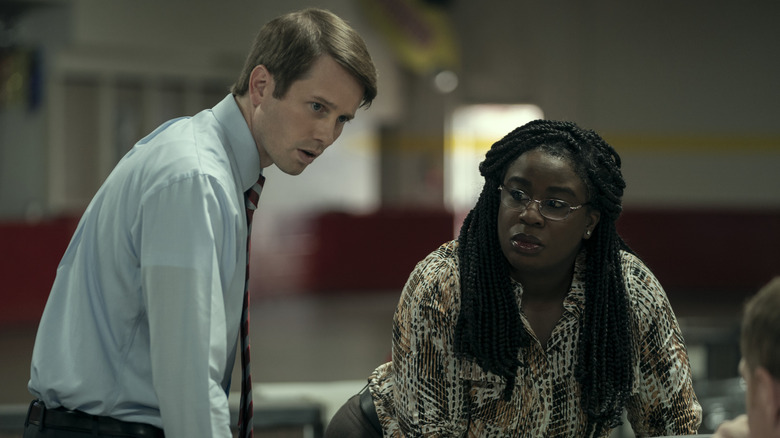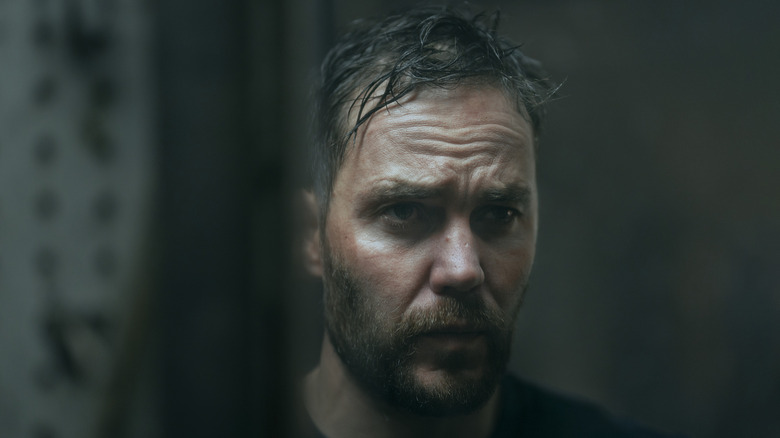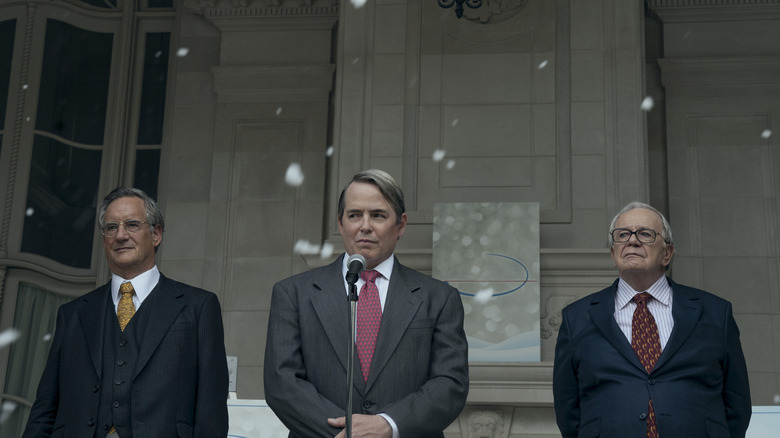Painkiller Review: A Flashy Crash Course On The Opioid Epidemic
- A coherent retelling of a familiar story
- Well-paced and easily digestible
- A great cast with strong performances
- The series doesn't dig deep enough
- The story's angle doesn't differ much from "Dopesick," which delivered in spades less than two years ago
Any film or TV show — regardless of the talent involved behind and before the camera — attempting to cover the birth and aftermath of the opioid crisis after Hulu's painstakingly fascinating "Dopesick" was going to have a tough time. Yet, here we are, less than two years after the Michael Keaton-led Emmy-winning miniseries, and Netflix's latest six-episode drama, "Painkiller," gives its shot to tell the familiar story from a slightly different perspective. The result? A flashier, more digestible, yet less comprehensive crash course on America's opioid epidemic, its unfortunate victims, and its cold-hearted billionaires.
This time, based on Barry Meier's book "Pain Killer" and a New Yorker Magazine article by Patrick Radden Keefe, the history of OxyContin is recounted by Edie Flowers (an unshakable Uzo Aduba). She's a U.S. attorney investigator brought in by a team of prosecutors to help their ongoing case against Purdue Pharma and its president Richard Sackler (a restrained Matthew Broderick). Through her detailed testimony, we go back to 1998 to learn about how the highly addictive drug was created and found its way to doctors' offices (and then patients) all over the United States in the following two decades.
Besides joining Flowers' investigation, we're also introduced to the Sackler family, prominently to Arthur (Clark Gregg) and his nephew Richard, who played the key role in making OxyContin a billion-dollar product approved by the FDA for treating pain. Providing the victims' perspective, we get to know Glen Kryger (a brooding Taylor Kitsch), a working-class mechanic and family man, after he suffers a severe back injury and is prescribed OxyContin following surgery. And finally, the business side of things is represented by veteran Purdue Pharma sales rep Britt (Dina Shihabi) and her latest recruit, Shannon (West Duchovny), a naïve and impressionable ex-college athlete desperate to move out from her parent's home and find financial stability.
The characters revel in representing integrity and vulnerability
Creators Micah Fitzerman-Blue and Noah Harpster (who wrote and co-wrote all six episodes) establish a good balance by giving these characters just the right amount of screentime — slightly tipping the scale for the victims and the central people fighting Purdue — that makes the plot coherent and free-flowing. The series works best and hits the right notes when it lets characters like Edie and Glen overtake the often plot-driven narrative and focus on their individual struggles.
For instance, Edie's personal investment and agenda against the Sacklers and taking OxyContin off the market is fuelled by her relationship with her incarcerated drug dealer brother and her late mother, whom she lost to addiction. It's what gives her an unwavering determination, an urge to seek justice no matter what it costs or how long it takes. She might be an obsessive and boundary-pushing workaholic, but fighting for the right cause gives her character admirable integrity. Glen, on the other hand, represents the hardworking, family-oriented little man who becomes an addict through no fault of his own. He's a textbook case, no doubt, but it's impossible not to feel for him as he slowly loses his family and desperately seeks ways to get his next fix.
But regardless of how on-point "Painkiller's" scripted dramatization gets by portraying such characters as Glen and Edie, it can never reach the emotional climax the real victims provide in their brief testimonies before the start of every episode — talking about the children they lost to OxyContin. The overwhelming pain their eyes project hits hard every single time. Though that might sound calculated and manipulative from a viewer's standpoint, it's a thoughtful touch to honor the dead and their loved ones by giving them a chance to share their stories.
The Sacklers' wickedness isn't emphasized enough
And, of course, there are the Sacklers the series depicts as villains from the get-go, keeping most of them one-note characters. They're the Big Bad Men we're supposed to loathe, and while we do, "Painkiller" purposely keeps them vague and only touches base in showing the role they played in causing the epidemic. It's an approach that works more or less in this particular retelling of the story but misses the chance of breaking them down as very real and evil human beings. They're savvy, cold-hearted businessmen (the children of capitalism) driven only by greed and an inclination for making a fortune by preying on the weak and vulnerable.
While the writers make attempts to display their sociopathic behavior — mainly showing Richard's relentless need to achieve success by any means necessary and his imaginary conversations with his dead uncle, who was obsessed with leaving a reputable legacy — it only scratches the surface of their pure wickedness. See, the Sacklers weren't just villains, they were human monsters of the worst kind, and that can never be overstated when it comes to the case of Purdue Pharma.
However, despite its shortcomings, "Painkiller" succeeds in summing up the opioid crisis by focusing on its most significant developments, turning points, and the people responsible for them. Due to the competence of veteran filmmaker Peter Berg (who directed every episode), the plot flows smoothly and dynamically while allowing most characters to fulfill their arcs and arrive at a natural endpoint rooted in the consequences of their actions and decisions.
And even if the series doesn't always dig as deep as it should, it manages to justify its existence and prove that tragic and substantial stories like this can't be told often and loud enough. Because remembering the victims and holding the people who are responsible for their deaths accountable will never lose its significance — and the same goes for inspiring to seek justice against even the wealthiest and most powerful.
"Painkiller" premieres on Netflix on August 10.
If you or anyone you know needs help with addiction issues, help is available. Visit the Substance Abuse and Mental Health Services Administration website or contact SAMHSA's National Helpline at 1-800-662-HELP (4357).
This piece was written during the 2023 WGA and SAG-AFTRA strikes. Without the labor of the writers and actors currently on strike, the series being reviewed here wouldn't exist.


